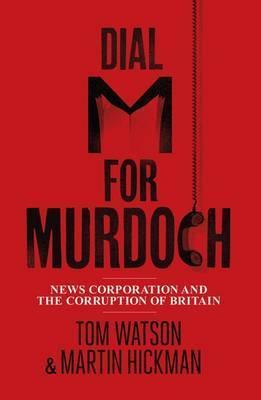What do you think?
Rate this book


'This book uncovers the inner workings of one of the most powerful companies in the world: how it came to exert a poisonous, secretive influence on public life in Britain, how it used its huge power to bully, intimidate and cover up, and how its exposure has changed the way we look at our politicians, our police service and our press.'
Rupert Murdoch's newspapers had been hacking phones, blagging information and casually destroying people's lives for years, but it was only after a trivial report about Prince William's knee in 2005 that detectives stumbled on a criminal conspiracy. A five-year cover-up then concealed and muddied the truth. Dial M for Murdoch gives the first connected account of the extraordinary lengths to which the Murdochs' News Corporation went to "put the problem in a box" (in James Murdoch's words), how its efforts to maintain and extend its power were aided by its political and police friends, and how it was finally exposed.
The book is full of details which have never been disclosed before in public, including the smears and threats against politicians, journalists and lawyers. It reveals the existence of brave insiders who pointed those pursuing the investigation towards pieces of secret information that cracked open the case.
By contrast, many of the main players in the book are unsavoury, but by the end of it you have a clear idea of what they did. Seeing the story whole, as it is presented here for the first time, allows the character of the organisation which it portrays to emerge unmistakeably. You will hardly believe it.
384 pages, Paperback
First published April 1, 2012
Brady explained to William and his brother Harry that during his time as a royal correspondent, redtop reporters sometimes hacked voicemail messages.That was in 2005. Ten years later, Bradby gave a slightly fuller account in a BBC documentary, Reinventing the Royals (this is my own transcript):
And I said, "well listen, when I first became royal correspondent I was told that, you know, reporters quite regularly listen in to each other's voice messages. I would be amazed if they're not still doing it."This issue of journalists hacking one another is referenced in passing in Dial M for Murdoch; stories on the subject appeared in 2011, although it is now known that the Mail on Sunday was told by police in 2006 that its journalists had been targeted. For some reason, the paper decided to keep this information to itself. Watson and Hickman note that in 2007, the actor Hugh Grant accused the Mail on Sunday of hacking his phone, although his deduction was conjectural and was dismissed by the paper as "mendacious smears" (a somewhat self-righteous turn of phrase for a paper then in the process of paying Grant damages for libel).
Plaid Cymru MP Adam Price claimed that the committee’s members had been warned that if they had called Brooks [before the committee], their private lives would be raked over.
Boris Johnson [..] had been warned by the Met’s inquiry in 2006 that he had been hacked by Glenn Mulcaire, but he had not sued then or later; and though he was chairman of the Metropolitan Police Authority (which oversaw London’s police force) he had also failed to do anything in July 2009 on publication of the Gordon Taylor story. Johnson knew he might need the full-blooded support of News International at the mayoral election in May 2012 or if he was to fulfil his long-held ambition to become Prime Minister.
As they raced to contact other victims of crimes, Scotland Yard had informed Graham Foulkes, whose 22-year-old son died in the 7/7 bombings in July 2005, of evidence that his phone had been hacked.